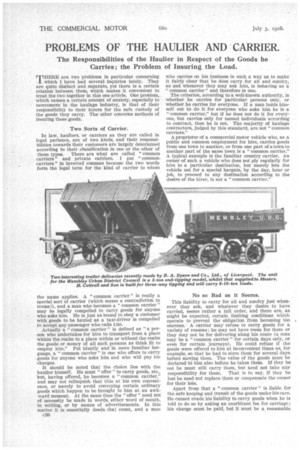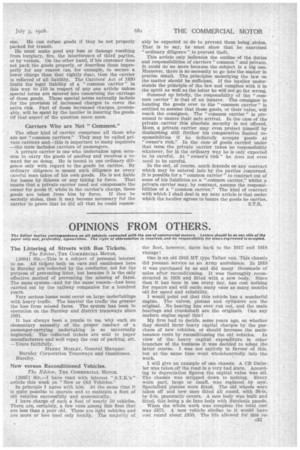PROBLEMS OF THE HAULIER AND ° CARRIER.
Page 58

Page 59

If you've noticed an error in this article please click here to report it so we can fix it.
The Responsibilities of the Haulier in Respect of the Goods he Carries; the Problem of Insuring the Load.
MHERE are two problems in particular concerning _L which I have had several inquiries lately. They are quite distinct and separate, yet there is a certain relation between them, which makes it convenient to treat the two together in this one article. One problem, which causes a certain amount of anxiety, especially to newcomers in the haulage industry, is that of their responsibility to their hirers for the safe custody of the goods they carry. The other concerns methods of insuring those goods.
Two Sorts of Carrier.
In law, hauliers, or carriers as they are called in legal parlance, are of two kinds, and their responsibilities towards their customers are largely determined according to their ,classification in one or the other of these types. There are what are called "common carriers" and private carriers. I put "common carriers" in inverted commas because the two words form the legal term for the kind of carrier to whom the name applies. A "common carrier" is really a special sort of carrier (which seems a contradiction in terms!), and a man who becomes a "common carrier" may be legally compelled to carry goods for anyone who asks him. He is just as bound to obey a customer with goods to be hauled as a taxi-driver is compelled to accept any passenger who calls him.
Actually a "common carrier" is defined as "a person who undertakes for hire to transport from a place within the realm to a place within or without the realm the goods or money of all such persons as think fit to employ him." Put bluntly and in more familiar language, a "common carrier" is one who offers to carry goods for anyone who asks him and who will pay his charges.
It should be noted that the choice lies with the haulier himself. He must " offer " to carry goods, etc., but, having offered, he becomes a "common carrier," and may not relinquish that title at his own convenience, or merely to avoid conveying certain ordinary goods which happen to be brought to him at an awkward moment. At the same time the " offer " need not of necessity be made in words, either word of mouth, in writing, or by means of advertisements. In this matter it is essentially deedsthat count, and a man
c38 who carries on his business in such a way as to make it fairly clear that he does carry for all and sundry, as and whenever they may ask him, is behaving as a "common carrier" and therefore is one.
The criterion, according to a well-known authority, is whether he carries for particular persons only, or whether he carries for everyone. If a man holds himself out to do it for everyone who asks him he is a "common carrier," but if he does not do it for everyone, but carries only for named individuals according to contract, then he is not. The majority of haulage contractors, judged by this standard, are not "common carriers."
A proprietor of a commercial motor vehicle who, as a public and common employment for hire, carries goods from one town to another, or from one part of a town to another part of the same town is a "common carrier." A. typical example is the familiar country carrier. An owner of such a vehicle who does not ply regularly for hire to a particular destination, but merely lets the vehicle out for a special bargain, by the day, hour or job, to proceed to any destination according to the desire of the hirer, is not a "common carrier."
No so Bad as it Seems.
This liability to carry for all and sundry just whenever they ask, and whatever they desire to have carried, seems rather a tall order, and there are, as might be expected, certain limiting conditions which operate to prevent the obligation from becoming too onerous. A carrier may refuse to carry goods for a variety of reasons : he may not have room for them or they may not be for delivering along his route (a man may be a "common carrier" for certain days only, or even for certain journeys). He could refuse if the goods were offered to him at inconvenient times as, for example, so that he had to store them for several days before moving them. The value of the goods must be declared to him also before he takes them. If they be not he must still carry them, but need not take any responsibility for them. That is to say, if they be lost he need not replace them or compensate the owner for their loin.
Apart from that a "common carrier" is liable for the safe keeping and transit of the goods under his care. He cannot evade his liability to carry goods when he is told to do so by asking an exorbitant fee for carriage ; his charge must be paid, but it must be a reasonable
one. He can refuse goods if they be not properly packed for transit.
He must make good any loss or damage resulting from burglary, fire, the interference of third parties, or by vermin. On the other hand, if his customer does not pack, the goods properly, or describes them improperly for any reason (as, for example, to secure a lower charge than that rightly due), then the carrier • is relieved of all liability. The Carriers' Act of 1830 limits the legal liability of a "common carrier" in this way to 1.10 in respect of any one article unless special terms are entered into concerning the carriage of those goods. Those special terms naturally include for the provision of increased charges to cover the extra risk. Part of those increased charges, presumably, will be spent by the haulier in insuring the goods. Of that aspect of the question more anon.
Carriers Who are Not " Common."
The other kind of carrier comprises all those who are not "common carriers." They may be called private carriers and—this is important to many inquirers —the term includes carriers of passengers.
A private carrier is one who undertakes upon occasion to carry the goods of another and receives a reward for so doing. He is bound to use ordinary diligence only with regard to the goods he carries. By ordinary diligence is meant such diligence as every careful man takes of his own goods. He is not liable for losses by thieves or any taking by force. That means that a private carrier need not compensate the owner for goods if, while in the carrier's charge, these goods are taken from him by force. If they be secretly stolen, then it may become necessary for the carrier to prove that he did all that he could reason ably be expected to do to prevent them being stolen. That is to say, he must show that he exercised "ordinary diligence ". to prevent theft.
This article only indicates the outline of the duties and responsibilities of carriers " common " and private. It could do no more because the subject is a big one. Moreover, there is no necessity to go into the matter in precise detail. The principles Underlying the law on the matter should be sufficient. If the haulier understands the principle of the law and complies with it in the spirit as well as the letter he will not go far wrong. Summed up briefly, the responsibility of the "common carrier" is that of an insurer. The consignor in banding the goods over to the "common carrier" is entitled to assume that these goods, or their value, will reach the consignee. The "common carrier" is presumed to ensure their safe arrival. In the case of the private carrier this absolute security is not offered. More, a private carrier may even protect himself by diminishing still further -his comparative limited responsibilities if he definitely accepts goods at "owner's risk." In the case of goods carried under that term the private carrier takes no responsibility whatever, for in the ordinary way he is only expected to be careful, At "owner's risk" he does not even need to be careful.
In the end, of course, much depends on any contract which may be entered into by the parties concerned. It is possible for a " common carrier" to contract out of some of his liabilities as a " conimon carrier," whilst a • private carrier may, by contract, assume the responsibilities of a "common carrier." The kind of contract with which I shall deal in ray next article is that under which the haulier agrees to insure the goods he carries.
S.T.R.












































































































